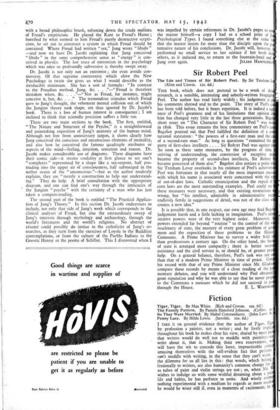Sir Robert Peel
The Lite and Times of Sir Robert Peel. By Sir Tresham (Al!en and Unwin. x2s. 6d.) THIS book, which does not pretend to be a work of de research, is a sensible, interesting and soberly-written biograph Peel. The author has read fairly widely • his judgement is g his comments shrewd and to the point. The story of Peel's has been told before, but it bears repetition. It is indeed a si once of Peel's greatness and of his limitations that opinion a him has changed very little in the last three generations. Bag short essay on "The Character of Sir Robert Peel " was w in 1856. This essay remains the best commentary on Peel's Bagehot pointed out that Peel fulfilled the definition of a c tutional statesman: " the powers of a first-rate man and the of a second-rate man." As long as questions " remained the perty of first-class intellects . . . . Sir Robert Peel was against So soon as these same measures, by the progress of time, striving of understanding, the conversion of receptive m became the property of second-class intellects, Sir Robert became possessed of them also." Bagehot also notices a point v. Sir Tresham Lever overlooks in his estimate of Peel's achievem Peel was fortunate in that nearly all the most important mea with which his name is associated were concerned with the of out-of-date laws. Catholic emancipation and the repeal of corn laws are the most outstanding examples.. Peel could see these measures were necessary, and that existing restrictions wrong, but " his intellect, admirable in administrative rou endlessly fertile in suggestions of detail, was not of the class w creates a new idea."
It is possible that, in one respect, our own age may find Bage judgement harsh and a little lacking in imagination. Peel's a strative powers were of the very highest order. Moreover, powers extended far beyond " routine " to the control of the w machinery of state, the mastery of every great problem of gos ment and the exposition of these problems to the Hou Commons. A Prime Minister has to survey a wider field t than predecessors a century ago. On the other hand, the bus of state is arranged more compactly; there is better secre assistance and the civil service is, or should be, of greater pea help. On a general balance, therefore, Peel's task was not than that of a modern Prime Minister in time of peace. Co his record with that of any Prime Minister since Mr. Glads compare these records by means of a close reading of the p mentary debates, and you will understand why Peel obtained great reputation and why he was able to say that he never pro to the Commons a measure which he did not succeed in pa


























 Previous page
Previous page